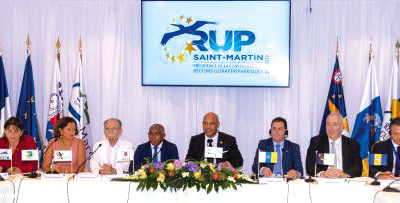During the internal session of the presidents of the ORs last Thursday, they exchanged views on the challenges ahead and reaffirmed their desire to work together to protect the interests of the nine territories.
President Daniel Gibbs opened the session by recalling “the urgency of continuing to work together to defend the interests of our Regions. Because, in the current political context, especially in France, nobody will do it for us, "he insisted. "We are, at the same time, worried, united and determined," said the president before presenting the results of his presidency.
Among the main challenges of the Presidency of Saint-Martin, six major areas were the subject of substantive work within the CPRUP in 2019: monitoring the implementation of the RUP Communication presented by the Commission in October 2017; defending the status of the ORs, in particular in the context of negotiations on the new post 2020 programming period; an analysis of the acquisition of a legal status for the Conference; the pursuit of joint activities between ORs and partnership sessions with the European Commission in areas of common interest; the external visibility of the Conference; the annual conference in Saint-Martin.
The presidency of Saint-Martin has been responsible for the administration of the CPRUP website, initially set up by the Canarian presidency (2017-2018), throughout its almost fifteen-month mandate. The site was regularly updated and made it possible to disseminate to the public all the activities carried out by the Conference or its regions.
In addition, still with a view to strengthening the visibility of the outermost regions, the Monitoring Committee met in May 2019 with the liaison unit of the research service of the European Parliament.
Within the framework of the missions of the liaison office, focused on setting up information and communication activities towards regional and local actors and on improving cooperation with public authorities, this cooperation is a means of contribute to the development and implementation of European policies.
At the close of the internal session, President Gibbs recalled the need to maintain, "in constant euros", for the period 2021-2027, the envelopes obtained for the period 2014-2020. The ORs must also “fight” to maintain the “historic” co-financing rate of 85%, which risks being lowered to 70%. "Far too many local beneficiaries, public and private, would not be able to co-finance projects up to 30%", worried the president.
Another necessity for the nine outermost regions is to fight against the possibility of seeing the new additional cost allocation from the “FSE Plus”, to be introduced by simply redeploying the current additional cost allocation from the ERDF. For Daniel Gibbs, "it would be harmful, given our training needs."
The primary objective of the Collectivity of Saint-Martin for the post-2020 programming of the Structural Funds remains the obtaining of its own Operational Programs (OPs) hosting credits corresponding to the real needs of the territory, including in terms of regional cooperation.
For the president of Saint-Martin, “you have to be recognized in statistical matters. In the short term, it is therefore a question of obtaining the classification of Saint-Martin as a “NUTS 2” region, thanks to a derogatory application of European regulations, as was the case for Mayotte ”.
At the end of the session, the presidents signed the 2020 final declaration which reiterates the ORs' commitment to constructive dialogue within the framework of a strengthened partnership with the European institutions, and recalls the importance of a creative Europe of employment and social cohesion, refocused on the expectations of its inhabitants and on its fundamental values.
The presidents will be mobilized on the defense of the differentiated legal status of the outermost regions during the future “Conference on the future of Europe”, by establishing the main lines which will guide the future of the ORs within the European Union. . They express their will to actively contribute to the work to be undertaken so that the reality of our regions is not overlooked in defining our common future. Finally, they refuse to allow the cohesion policy and the common agricultural policy to be deliberately sacrificed in favor of new priorities for the Commission and certain Member States. They therefore oppose any reduction in budgetary allocations for cohesion policy, the common agricultural policy (POSEI and EAFRD) and the common fisheries policy.
The presidents also call for the reinstatement of POSEI's funding during the transitional period and request that the historic rate of co-financing be maintained at 85%, in order to ensure economic development, social progress as well as continued catching up. in terms of structuring equipment and the convergence of the ORs with standard EU living standards.
6,124 total views











No comments